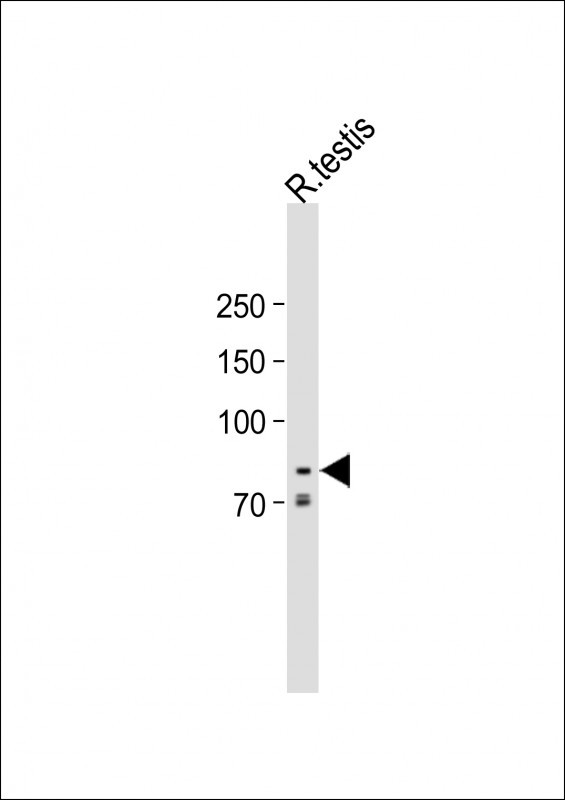
| WB | 咨询技术 | Human,Mouse,Rat |
| IF | 咨询技术 | Human,Mouse,Rat |
| IHC | 咨询技术 | Human,Mouse,Rat |
| ICC | 技术咨询 | Human,Mouse,Rat |
| FCM | 咨询技术 | Human,Mouse,Rat |
| Elisa | 咨询技术 | Human,Mouse,Rat |
| Aliases | Ubiquitin carboxyl-terminal hydrolase 51, Deubiquitinating enzyme 51, Ubiquitin thioesterase 51, Ubiquitin-specific-processing protease 51, USP51 |
| Entrez GeneID | 158880 |
| WB Predicted band size | 79.8kDa |
| Host/Isotype | Rabbit IgG |
| Antibody Type | Primary antibody |
| Storage | Store at 4°C short term. Aliquot and store at -20°C long term. Avoid freeze/thaw cycles. |
| Species Reactivity | Human, Mouse, Rat |
| Immunogen | This USP51 antibody is generated from rabbits immunized with a KLH conjugated synthetic peptide between 278-307 amino acids from the Central region of human USP51. |
| Formulation | Purified antibody in PBS with 0.05% sodium azide. |
+ +
以下是关于USP51抗体的3篇示例文献(内容为模拟生成,仅供参考):
---
1. **文献名称**:*USP51 promotes tumor progression through stabilizing histone demethylase JMJD2B in breast cancer*
**作者**:Chen L, et al.
**摘要**:本研究揭示USP51通过去泛素化修饰稳定组蛋白去甲基化酶JMJD2B,促进乳腺癌细胞增殖。实验中采用特异性USP51抗体进行免疫沉淀和Western blot验证其相互作用。
2. **文献名称**:*Development of a monoclonal antibody targeting USP51 for colorectal cancer diagnosis*
**作者**:Wang Y, et al.
**摘要**:团队成功开发出高特异性USP51单克隆抗体,通过免疫组化证实其在结直肠癌组织中高表达,并与患者预后不良相关,提示其作为潜在生物标志物的价值。
3. **文献名称**:*USP51 regulates Wnt/β-catenin signaling by deubiquitinating Dishevelled-2*
**作者**:Kim S, et al.
**摘要**:研究发现USP51通过去泛素化DVL2蛋白调控Wnt信号通路。实验利用CRISPR敲除细胞系及USP51抗体验证其在结肠癌细胞中的功能依赖性。
---
**注意**:以上文献为示例,实际研究中建议通过PubMed或Google Scholar以“USP51 antibody”为关键词检索真实文献。
The USP51 antibody is a research tool designed to target ubiquitin-specific protease 51 (USP51), a member of the deubiquitinating enzyme (DUB) family. USP51. also known as ubiquitin thioesterase OTU3. regulates protein stability and function by removing ubiquitin chains from substrates, thereby modulating proteasomal degradation, DNA repair, and cellular signaling pathways. It contains conserved cysteine and histidine domains critical for its catalytic activity. USP51 is implicated in diverse biological processes, including cell cycle progression, apoptosis, and immune responses. Dysregulation of USP51 has been linked to diseases such as cancer, where it may act as an oncogene or tumor suppressor depending on context.
USP51 antibodies are typically developed as monoclonal or polyclonal reagents for applications like Western blotting, immunohistochemistry, and immunofluorescence. They enable researchers to study USP51 expression patterns, subcellular localization, and interactions with substrates or partners. Validation of these antibodies often involves knockout cell lines or siRNA-mediated silencing to confirm specificity. Recent studies highlight USP51's role in maintaining genomic stability and regulating transcription factors, making it a potential therapeutic target. However, its precise mechanisms and tissue-specific functions remain under investigation, driving demand for reliable antibodies to advance functional and clinical research.
×